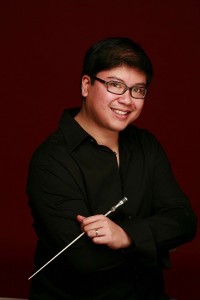GERARD Salonga is emerging to be a star all his own.
The brother of multi-awarded international singer Lea Salonga, Gerard is carving a place in another musical field: conducting.
Through the years, the Philippines has produced world-class instrumentalists, namely, Cecile Licad (piano), Joseph Esmilla (violin) and Victor Michael Coo, Chino Bolipata, Renato Lucas (cello).
Sad to say, no wielder of the baton has been given such recognition although the country has a stable of competent conductors, including Oscar Yatco, Julian Quirit, Sergio Esmilla, Jr., Francisco Feliciano and the late Basilio Manalo.
Gerard may yet be the country’s answer to renowned conductor, composer and pianist Leonard Bernstein.
His credentials speak for themselves. His music-making is first-rate, adapting well to the masa (masses) and the elite, and does well in both pop and classical genres. He is not only a good arranger, but is also into film scoring.
Soloists love him and most of all, he registers well on TV, which is the last hope of classical music to make an impact on national consciousness.
Last week, Gerard was seen on TV (Net25) hosting a musical program and later appearing in a TV broadcast while conducting his newly born FILharmoniKA orchestra in an evening of De Falla and Saint-Saens with no less than Cecile Licad as its formidable soloist. It was Licad’s night all right but the conductor made an equal audience impact.
Gerard has a very young, cherubic appeal that doesn’t diminish serious music-making.
A summa cum laude graduate of Berklee College of Music in Boston, Gerard debuted as conductor conducting “Carousel” for Repertory Philippines when he was just 23.
“I didn’t know anything and I was scared as hell,” he recalled. “Luckily the orchestra was very helpful, and I was extremely well-prepared. That first time in front of the orchestra is still very clear in my mind.”
He said his most memorable engagements included his first time to conduct in front of the Hong Kong Philharmonic and the night FILharmoniKA gave the Philippine premiere of Stravinsky’s Dumbarton Oaks Concerto for chamber orchestra last April.
“That’s a very difficult piece, and we prepared very hard for it and performed it quite well,” he said. “I never thought I’d hear that piece played here any time soon.”
After working with Licad and earlier with cellist Richard Bamping, Gerard has emerged as the Filipino conductor with star potential.
He is articulate with music which makes him perfect for radio and TV music appreciation programs. He connects with the Filipino mass audience in as much as he is careful not to offend the sensibilities of the classical “purists” which are tightly ensconced in Manila’s music scene.
The fact is he made a big impact at the recently concluded First National Orchestra Festival of the Cultural Center of the Philippines, which he thinks bodes well for Filipino musicians and future audiences of classical music.
Gerard said: “Filipinos are so naturally musical and the tastes could be so much deeper than what they are now. We need to really destroy the idea that classical music is high brow and only for the rich or highly educated.”
The first time he conducted Sibelius’ Finlandia was in Taytay, Rizal, and the large crowd that gathered at the town plaza knew the music by heart.
He said: “From appearance, it didn’t look like there were a lot of millionaires there, nor did it look like there were a bunch of Harvard diplomas. But they love the music because it’s in their culture.”
“People need to realize that culture is not a ‘head and money’ thing; it’s an ‘ears and heart’ thing,” Gerard explained.
He said the government and existing cultural institutions can help a lot by way of helping fund private cultural endeavors. It should follow the German model, which initiates state funding just like in Hong Kong.
He urged the government to bring back the program that sends deserving music students to Europe to study, then come back and play in the Philippine Philharmonic Orchestra.
Gerard has gotten to the normal routine of fathering and studying musical scores. “I spend a lot of time with my kids, mainly because to study a piece of music, all I need are my colored markers and the score,” he explained.
He is married to violinist DJ Francisco and is now a father of two: Antonio Basilio, 3, and Carmen Beatriz, who was born last April 16 — the night before the conductor’s debut with the Dvorak cello concerto.
He gives a lot of credit to his mother, Ligaya Salonga. “The security and attention she gave us allowed us to learn to focus on the task at hand. We just never had to worry about anything else,” he said.
Gerard will conduct his FILharmoniKA anew for an evening of film music on November 13 at the Philamlife Theater.

